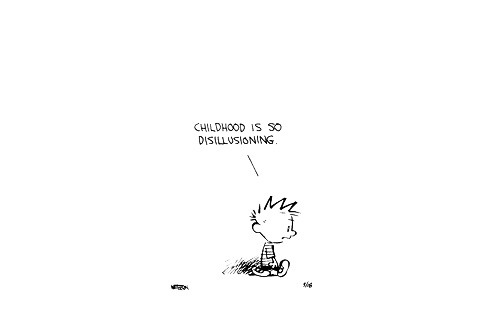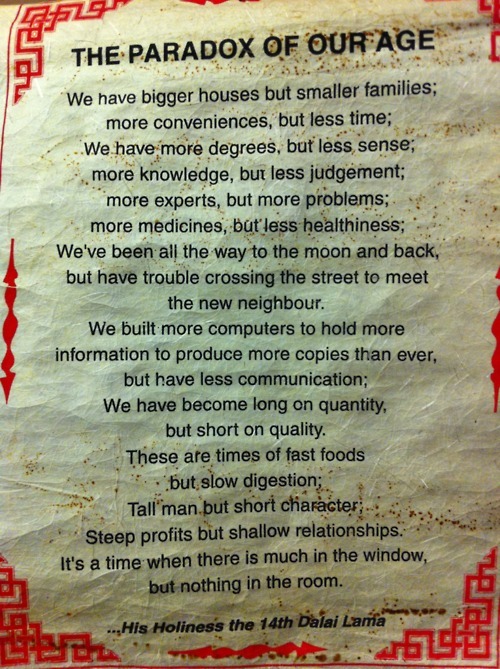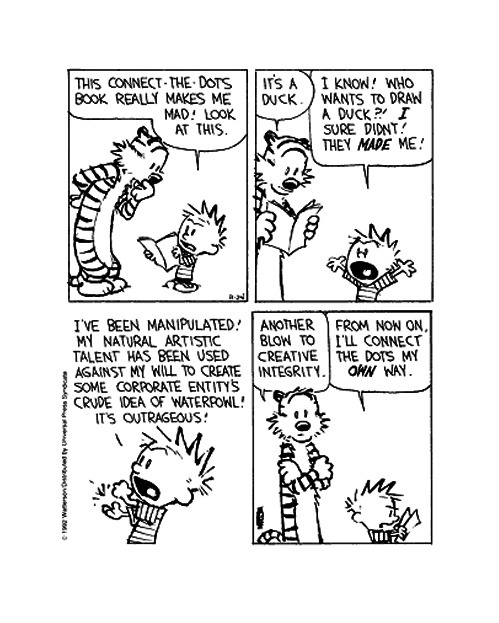Thursday 29 December 2011
Wednesday 21 December 2011
Tuesday 20 December 2011
Friday 16 December 2011
Wednesday 14 December 2011
Tuesday 13 December 2011
Spotting the Great but Imperfect Resume. by George Anders
Recruiters and senior executives express frustration these days about corporate talent hunts at all levels. The gripe: "We're pouring tremendous energy into finding the right resumes. But we're losing the ability to find the right people."
Directors of summer internship programs, for example, have soured on seemingly "perfect" students with 3.9 grade-point averages from elite schools, who have mastered multiple foreign languages. The reason: these recruits show surprisingly little initiative once they arrive at a big, busy company; they keep waiting to be told what to do. Ultra-rigorous screening of internship candidates has inadvertently eliminated the freewheeling mavericks of previous eras. Those earlier interns might have lacked great transcripts, but they didn't need anyone's permission to try something bold.
Small-company chief executive officers voice a similar lament. They are eager to hire lieutenants whose career zigzags have created a burning desire to succeed in a new job. In the boardroom, though, such plans elicit frowns. Directors keep nudging these CEOs to play it safe, filling the management team with steady performers whose work history closely matches the job at hand, even if there's no sense of "wow!" in the job interviews.
Insist on a perfect resume each time, and it's impossible to make the most of highly promising candidates with "jagged resumes." The lost opportunities can be excruciating. Imagine the remorse of a venture capitalist unwilling to back Steve Jobs in 1977, because the personal-computer pioneer never finished college. For that matter, consider Apple's fate in the 1990s, if the company hadn't invited Jobs back for a second turn at leading the company, even though his first run ended in dismissal.
As such extreme examples show, it's essential to get comfortable with a resume that features a puzzling mix of highs and lows. Bring such candidates into play, and suddenly tomorrow's unexpected stars become visible.
In researching my book The Rare Find, I focused on a small group of world-class organizations that pull ahead of competitors by making the most of jagged-resume candidates. Standout examples can be found everywhere from military special-forces units to some of Silicon Valley's top tech companies. This willingness to decouple from traditional strict scrutiny of paper credentials may look risky. But when it is pursued in a well-thought-out way, it's possible to sidestep most of the apparent hazards.
Two insights are crucial. First, organizations that consider jagged resumes have clear ideas of what high points they must see. Teach for America looks for perseverance. The New England Patriots look for a deep-seated desire to play football, not just to be a famous athlete. Linear Technology looks for tinkerers, who have been experimenting with electrical circuits since childhood.
In all these cases, organizations seize on a few central character traits that are well known internally as future markers of likely success. Such enterprises think harder about which candidates might grow the most on the job, rather than which ones already possess all needed competencies for the task at hand. Traits such as resilience, efficiency, curiosity and self-reliance are among the most likely ones to be prized. This bolder hiring philosophy can be summed up by the maxim: "Compromise on experience. Don't compromise on character."
Second, connoisseurs of the jagged resume have well-thought-out ideas about which apparent shortcomings don't matter (and which ones do.) Hopscotch work histories often are viewed leniently. Quirky personalities and inconsistent grades can be forgiven, too. There's no forbearance, though for lapses in ethics, an inability to work with people, or a lack of motivation. Jagged-resume hiring can succeed only if the cultural fit between candidate and company is unusually good, so warning flags in that area are taken seriously.
One of the most striking examples of jagged-resume hiring took place 40 years ago, at the University of Utah. David Evans, a lifelong explorer himself, took charge of the university's computer science department in 1965. Some people might have regarded Utah as a backwater. But in his first decade at the school, Evans spotted and attracted an extraordinary group of graduate students, including the later cofounders of Pixar, Netscape and Adobe Systems. For a time, just about every world-changing idea in computer graphics could be traced back to Evans's students in Utah.
What was Evans's secret? He looked for restless souls who were trying to get to the frontier. In some cases, they didn't know yet what frontier they were seeking. They had bounced around in college, switching majors three or four times. They had joined the Navy, or worked for Boeing, or tried a flurry of other false starts. They wanted to be on the forefront of some technical field. Evans celebrated their energy — and then turned them loose on some of the biggest unsolved computing problems of the day.
As Evans's son, Peter, recalled, "My dad looked at people very differently. He hired a lot of people that happened to fail history, or whatever else. Some of them you might even call scary. It didn't matter to him that they weren't polished in some areas that weren't important to their job performance. What he really cared about was what they liked to do."
The past three years of economic turmoil have created a lot more jagged resumes in the American labor force. For some employers, that's distasteful. For the next generation of David Evanses, that's a rare opportunity. As the U.S. economy starts to revive, the companies that end up hiring the best people will be the ones that evaluate jagged resumes most intelligently.
Monday 5 December 2011
Friday 2 December 2011
Thursday 1 December 2011
50/50
This is one of the good movies I have watched this year, probably because it has one of my favorite comedians but nevertheless this movie actually did not fall short of my expectations. I don't even want to go on about the plot of the movie or anything but what I can say is that it was refreshing to watch a movie about a cancer patient who, despite undertaking chemotherapy, still had the lungs to smoke weed and that the fact the movie did not have any reference whatsoever to any supreme being/ deity.
When it came to getting better it was a matter of "will he be ok?" no special healing or miracle event was recorded or mentioned throughout the movie.
Plain and simple this was a simple movie, no hero or super powers were involved, no fancy car (I consider the VW Golf as one of the coolest car but not the fancy or hottest car), no Greek mythological tales and I even doubt if CG was used?
A simple, funny, good movie. How much I enjoyed the movie? enough to go buy an original DVD and probably another copy for backup.
Wednesday 30 November 2011
Twitter acquires dynamic duo at Whisper Systems, works to beef up privacy / security. by Chris Barylick

Twitter acquires dynamic duo at Whisper Systems, works to beef up privacy / security originally appeared on Engadget on Tue, 29 Nov 2011 09:52:00 EDT. Please see our terms for use of feeds.
Permalink The Globe and Mail |
The Globe and Mail |  Reuters | Email this | Comments
Reuters | Email this | Comments



 <
<












